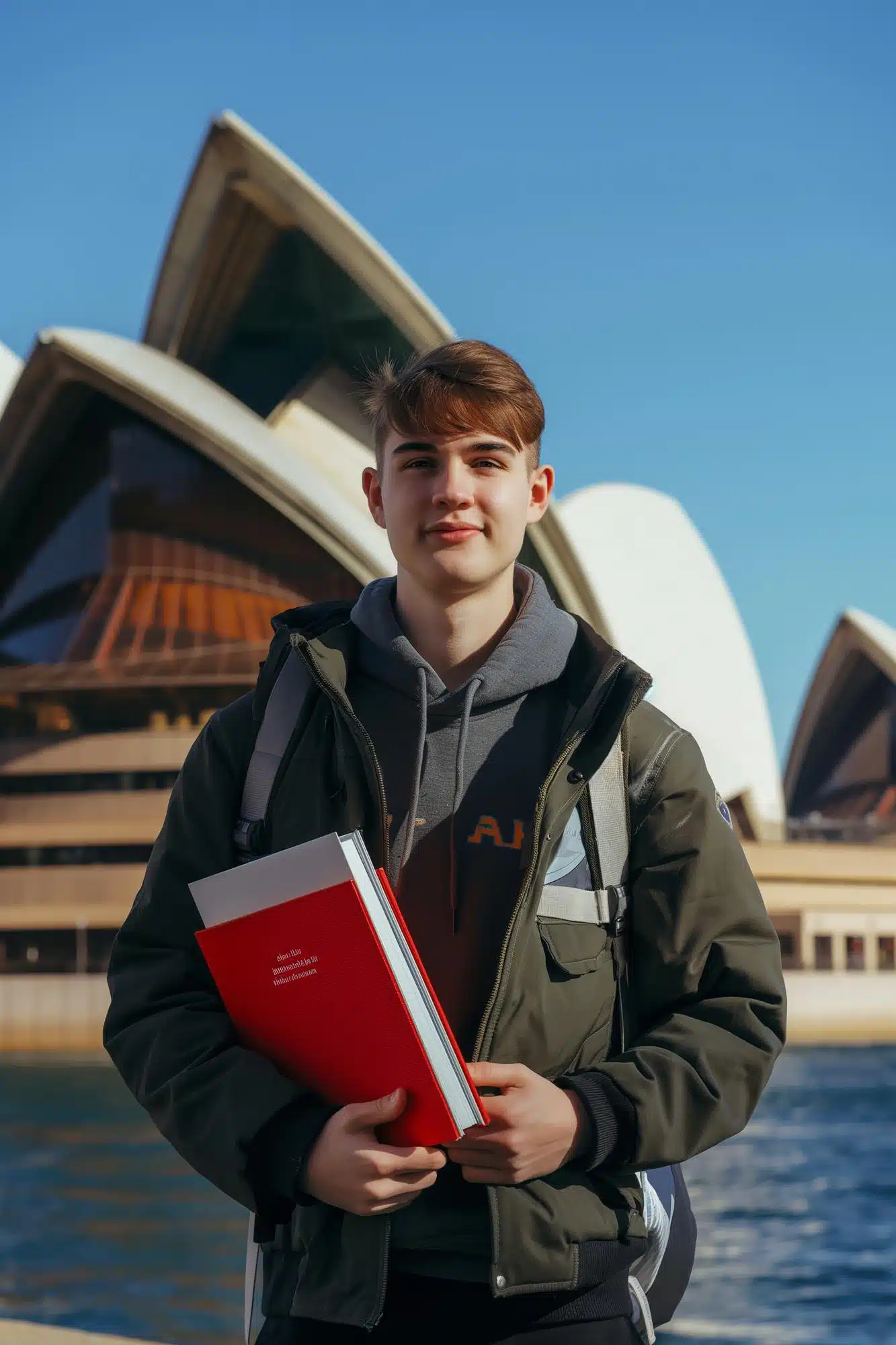Cultural diversity
Australia attracts aspirants from various parts of the world, making it a melting pot for diverse cultures…
Study in Australia with expert guidance on admissions, course selection, scholarships, IELTS, and student visa support. Start your study abroad journey today with a clear, step-by-step plan.



According to the Times Higher Education (THE) Young University Rankings 2022, 11 Australian universities have ranked in the top 50 universities. It is primarily because of its top-notch education, post-study work opportunities, globally-recognized degrees, and various scholarship opportunities. More than 22,000 courses are available to learners in over 29 study areas, providing them with a wide range of choices. Whatever course students choose, they can be assured of academic excellence.
For international undergraduate and graduate students studying in Australian universities, the average yearly tuition cost is AUD 30,840 and AUD 31,596, respectively. A doctorate in Australia can cost AUD 14,00 to AUD 37,00. The cost of a degree depends on the course selected by the students.
Hub of career opportunities, Australia has a high GDP per capita, robust economy, and lower poverty rate. Reports from the Government’s Department of Education Skills and Employment state that as of March 2020, 25,916 international students flocked to Australia for higher education in Management and Commerce, while 23,440 international students came to study Information Technology. 8,629 international students came to Australia to pursue Technology/Engineering. The availability of jobs in such sectors in Australia is a key reason why Bangladeshi students and aspiring professionals shift.
The country’s diversified population includes cultural experience, people, and cuisine. Studying here means gaining actual global exposure and extending one’s horizons. Another major attraction is the Australian way of life, which offers exquisite restaurants for meals, lovely outings or study trips, a plethora of exciting events throughout the year, first-rate public facilities, a well-developed transportation system, and a vibrant nightlife.
These elements significantly improve the satisfaction levels of students.
| Capital | Canberra |
|---|---|
| Area | 7,692,024 sq km |
| Population | 26 million |
| Language | English |
| Life Expectancy | 81 years (men), 85 years (women) |
| Economy | Australia has a highly developed and diverse economy. It is known for its abundance of natural resources, including minerals and agricultural products. Major industries include mining, agriculture, services, and manufacturing. |
| Currency | The Australian Dollar (AUD) |

Australia is the smallest continent and one of the largest countries on Earth. It is situated in the Southern Hemisphere, south east of the Asian continent. Due to Australia’s size and location, its geography is extremely diverse, ranging from the snow-capped mountains of the Australian Alps and Tasmania, to large deserts, tropical, and temperate forests.
Population
State & Territories
Australia is divided into six states and two territories. The states and territories, and their capital cities
Climate & Weather
In Australia (except the Northern Territory), the four seasons are experienced in the following months:
● Summer: December – February
● Autumn/Fall: March – May
● Winter: June – August
● Spring: September – November
The Northern Territory experiences two distinct seasons: the “dry” (May October) and the “wet” (November-April). The wet season is characterized by high humidity, monsoonal rains, and storms. The dry season is characterized by warm, dry, sunny days, and cool nights.
Languages
English is Australia’s primary language, but more than 200 other languages are also spoken in Australian households.
Australia is embracing international students from all directions of the map.
Below are the advantages of studying in Australia:
Australia attracts aspirants from various parts of the world, making it a melting pot for diverse cultures…
Australia enjoys strong business and trade links with nearby Asia, particularly China…
Australia offers world-class education and ranks highly for quality of life…
If you’re an animal-lover or you like to live life on the edge, Australia is an ultimate destination…
The Australian population is made up of many ethnicities and races following years of migration…
A student visa for Australia is generally straightforward with proper documentation and requirements…
Universities often support students in securing internships, building valuable work experience…
Sharing apartments or choosing homestays can help keep costs manageable for students…
Students often get access to updated technologies, devices, and modern learning environments…
International learners can usually work while studying, helping to support living expenses…
Degrees from Australian universities are widely recognized globally and valued across industries…

To provide students with wise options for the future, Australia’s educational system is well-structured.
The Australian education system has attained popularity because of the AQF, or Australian Qualifications Framework,
adopted in 1995. At the primary, secondary, and tertiary levels of education, the AQF primarily offers certificates
on different levels. Under the AQF educational system, various degrees are given, including
| Qualification | AQF Level | Duration | Description |
|---|---|---|---|
| Diploma | Level 5 | 1 – 2 years | Specializes in knowledge and skills for skilled or para-professional work and/or further study. |
| Associate Degree/Advanced Diploma | Level 6 | 1.5 – 2 years | Provides knowledge and skills for para-professional or highly skilled jobs and further learning. |
| Bachelor’s Degree | Level 7 | 3 – 4 years | Undergraduate degree that provides broad knowledge for professional careers or further learning. |
| Bachelor’s Honours Degree | Level 8 | 0.5 – 1 year | Specialized undergraduate degree offering advanced knowledge and skills for high-level jobs or future study. |
| Master’s Degree | Level 9 | 1 – 2 years | Expert-level graduate degree in a specific field, typically following a Bachelor’s degree. |
| Doctorate | Level 10 | 3 – 4 years | Postgraduate degree requiring extensive research and expertise in a specific field. |
Students can apply for several scholarships to help manage the cost of education in Australia. Below are some top scholarships for Bangladeshi students:
This scholarship is for students from selected countries within the Asia-Pacific region, Africa, and the Middle East who wish to pursue a Bachelor’s, Master’s, or Ph.D.
This scholarship is for students pursuing a Master’s or Ph.D. in Australia.
This scholarship is for women researchers in Technology, Engineering, Science, and Mathematics.
This scholarship is for students pursuing a postgraduate research degree (Master’s or Doctorate).
Many Australian universities offer a range of scholarships and financial aid.
These scholarships can ease tuition and living costs, helping Bangladeshi students study in Australia with less financial pressure.
Admission into a study course is dependent on the student’s past academic performance. Each institution specifies the minimum grades/marks or cumulative averages (GPAs) it will accept. In some cases, students also need to have completed one or more required subjects previously, known as prerequisite subjects.
Entry requirements vary between schools depending on the state or territory the student will be studying in. Academic performance and ability is considered during the application process. Students need to provide certified copies of their school reports from the last two years of study. A reference letter may also be required. Some schools, especially private schools, may require an entrance exam.
Entry requirements vary by qualification. In most cases, there are no entrance exams for VET institutions. However, some courses require students to have previously studied specific subjects or completed work experience:
| Test | Undergraduate | Postgraduate |
|---|---|---|
| IELTS | Overall 6.0, with no band less than 5.5. | Overall 6.5, with no band less than 6.0. |
| TOEFL | Overall 60, with each section 13. | Overall 80, with each section 20. |
| PTE | Overall 50, with each section 45. | Overall 58, with each section 50. |
| Cambridge English: Advanced (CAE) | Overall 169, with each section 162. | Overall 176, with each section 169. |
These are the minimum required scores; institutions may have higher requirements.
To gain entry into an Australian undergraduate course, students need to meet the following requirements:
To gain entry into an Australian postgraduate course, the following criteria apply:
Below is a structured overview of the Genuine Temporary Entrant (GTE), SOP requirements, visa process, documents, and dependent visa details — designed for easy reading on all devices.
The GTE requirement is designed to ensure that the student visa program is used appropriately. It helps confirm that the program is intended for international students seeking a quality education in Australia and not as a means of ongoing residency. It helps identify applicants whose motives may not align with the true purpose of the student visa.
We assess the following factors when considering your GTE:
We also evaluate your situation in Australia, considering:
We consider the benefits of the course to your future, including:
We review your previous immigration history, including:
If you are a minor, we also assess the intentions of your parent, legal guardian, or spouse in relation to your application.
Along with the Genuine Temporary Entrant (GTE) questionnaire, students must submit a Statement of Purpose (SOP). This document provides insight into the student’s background, current educational pursuits, and future career goals.
Education providers may require students to participate in an online or in-person interview after submitting the GTE questionnaire. In some cases, the interview may be waived.
Accepted payment methods include MasterCard, VISA, and American Express. Students should be mindful of additional banking fees and currency conversion costs if paying in Australian dollars.
International students may bring their family members under the Dependent Visa program. Dependents can be included in the original student visa application or apply separately once the student starts study. Dependents must complete Form 157A.
Below are key steps and information about biometrics, interview, rejection reasons, length of stay, processing timelines, and visa decision details.
Some students might need to provide biometrics. Most applicants will be advised immediately after submitting an application if they need to provide biometrics. Applicants will receive a letter and will also be able to see this request on their online application account. Students will have 14 days to provide biometrics so it is important to arrange an appointment quickly using the instructions in the request letter.
Most visa decisions are based on the information submitted with the visa application. In some cases, an interview might be required.
Some common reasons why a visa application might be rejected include:
The length of stay is based on the course the student intends to study. Study visas for tertiary education courses are typically issued for the full study duration, and up to a maximum of five years. Students will need to apply for a new study visa if they decide to enrol in another course after completing their current course.
The processing time for a complete study visa application varies by education sector and can range from 30 days to 3 months. Typically:
The student will be notified about the visa decision in writing once the application is processed. If approved, the communication will include:
 Chip Advisor, Counselor - Online
Koly Akter
Chip Advisor, Counselor - Online
Koly Akter
 Counselor - Online
Fahima Qasim
Counselor - Online
Fahima Qasim
 Counselor - Online
Shakila Sharmin Rubi
Counselor - Online
Shakila Sharmin Rubi
Use this feature to chat with our counselor.